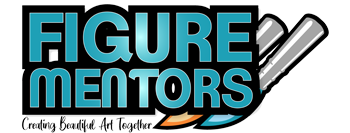NMM for beginners – the PRELUDE
Hi my name is Sergey Gybin, some of you may know me as Ravenswood on Facebook for instance and you can see most of my completed works on Putty & Paint HERE! I wrote this short tutorial (painting NMM on my Iron Warriors Siege Tyrants) aimed primarily at the beginners so hopefully they could easily master some simple methods to paint miniatures using NMM and OSL techniques. I concentrated on the practical side of the process without diving deep into theory and description of the basic techniques. Nevertheless there will be a bit of theory. Moreover, I didn’t emphasise the accuracy and layers transition, our helmet had to look great because of the contrast and brightness. I used a wet palette and Vallejo paints. On the upper row photos pure paints are presented for comparison, in the lower one are the mixes I used for painting the four different elements as listed below!
Steel NMM
The main thing in NMM is the contrast between the final highlights, shadows and reflections. In addition, it is very important to highlight the edges to keep the visual geometry of the objects. We will paint the backside of the helmet just a bit, because it will be covered by the armour.
For steel NMM I use a mix of dark brown and light blue colours. Depending on the light bue colour quantity I get brownish iron or bluish steel, but anyway there should be very little of the light blue.
Main colours: German Cam. Black Brown (VMC), Andra Blue (VMC), White
1 At first we cover all the surface with GBB.
2 Then we cover everything except the deepest recesses and a part of the faceplate with the main color GBB + AB (4:1 or 5:1). The lower part of the faceplate should remain this dark so the highlight we will do at the end looks brighter.
3-6 Highlight by adding white to the base mix. The contrast should be higher on the smaller parts, and smooth transition should be only on the upper part of the helmet. Notice that the edges under the helmet lenses are highlighted sharply to simplify the OSL effect at the end.
7 Place the extreme highlights as white dots and correct some inaccuracies.
8 Light feathering with the mix of GBB + AB needed to make the transitions smoother.
Bronze NMM
I make Bronze NMM in the same way as the steel but with one difference. Here we have to keep the tone from going into yellow or orange.
Moreover, keep in mind to follow the balance between extreme highlights on the upper side of the round plate, highlights in the lower one and the shadows between them.
Main colours : Black, Amarantha Red (VMC), Scrofulous Brown (VGC), Iraqi Sand (VMC).
1 Cover the black underlayer with the mix of the black and AR (1:1 approximately).
2-4 Highlight by adding more AB step by step, until the mix goes to orange.
5 Highlight by adding SB to the mix.
6 Highlight by adding IS to the mix.
7 Light feathering with the mix of black and AR (1:5) to smooth the transitions and recover the tone. After that we make the extreme highlights with pure IS. (Please note the Bronze NMM gallery also continues below in conjunction with the painting of the TUBES).
TUBES
Main colours : Black, Dark Sea Blue (VMC), Iraqi Sand (VMC).
1 Cover the Black underlayer with the mix of Black and DSB (1:2 approximately).
2 Highlight by adding IS to the mix. Notice that I highlighted about 2/3 of the edge and a small spot below.
3 Highlight another time by adding IS and reducing the surface of highlight.
4 Extreme highlighting with pure IS.
Lenses and OSL
The main principle of how to make a good lighting effect is to leave the contrast on the borders around the source. To do that the surface around the glowing object should be the darkest, except the adjacent edges. It is important to leave a distinct border between the source object and the reflection of its light on the nearby surfaces.
Main colours: Black, Dark Vermilion (VMC), Scrofulous Brown (VGC), white.
1 Cover all of the Black underlayer with the mix of Black and DV (1:2). It is very important to keep the Black border between the lenses of the helmet and its other parts.
2 Highlight with the pure DV. Highlight will take about 2/3 of the lens near the nose bridge and a small but distinct spot in the opposite corner.
3 Highlight with the mix of DV and SB (1:1) reducing the surface of the highlight.
4 Highlight the lenses with pure White.
6 Make the feathering of all the lens surfaces with a highly diluted DV to smooth the colour transitions. Make the feathering in several semi transparent layers the space around lenses to create the OSL effect.
7 Correct the inaccuracies on all the surfaces of the helmet. Work is done! Below you can see the final gallery!
Many thanks to Jay and the figurementors team for the opportunity but also to you the reader, I hope someone may have found this useful!!
Ravenswood.






